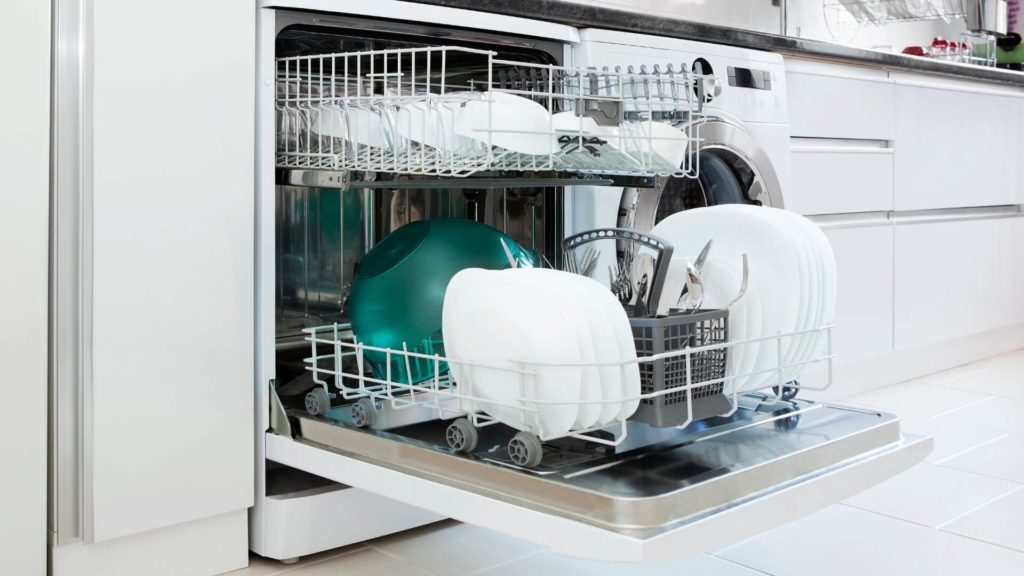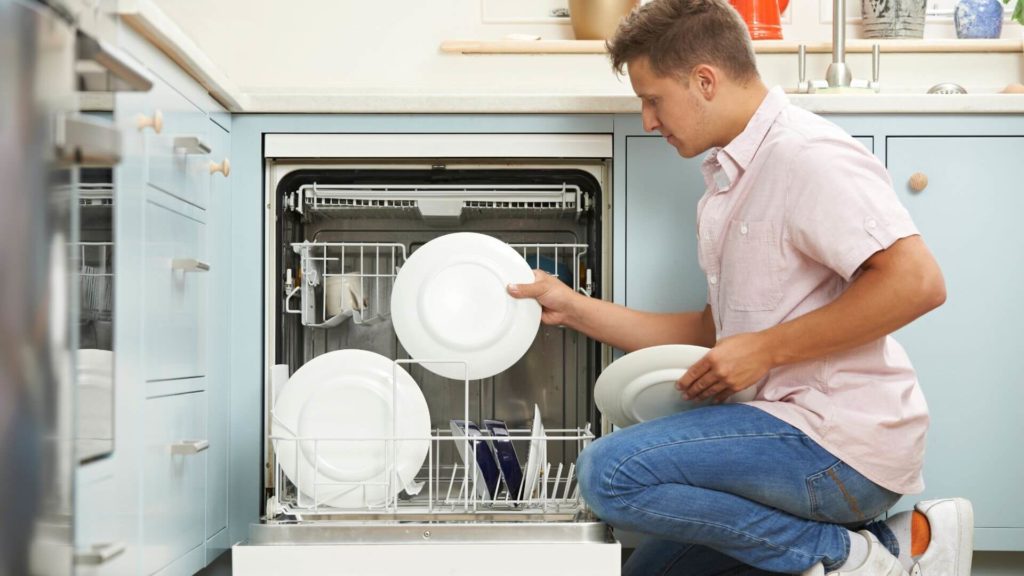A dishwasher is designed to clean cutlery, cookware, and dishware automatically. The mechanical dishwasher washes dishes by spraying hot water, typically between 45 and 75 °C (110 and 170 °F), with lower temperatures used for fragile goods. This is more efficient than manual dishwashing, which relies on physical scrubbing to remove soiling.
Dishwasher detergent and water are combined, and the cleaning solution is pushed to one or more spinning sprayers. To conserve water and energy, the mixture is repeatedly stirred. Frequently, there is a pre-rinse that may or may not use detergent, followed by draining the water. The primary wash with fresh water and detergent comes next. After the wash cycle is ended, the water is drained; then, using an electro-mechanical solenoid valve, more hot water is pumped into the tub to start the rinse cycle(s). Once the rinse is complete, the water is drained, and one of several drying techniques is used to dry the dishes. Typically, water spots from hard water or other causes are reduced using a rinse-aid, a chemical that lowers and prevents the water’s surface tension.

Industrial dishwashers are available in commercial businesses like hotels and restaurants, where many dishes need to be cleaned and household models. A booster heater that will produce a “final rinse” temperature of 82 °C (180 °F) or the use of a chemical sanitizer are both used to achieve cleanliness after washing at temperatures between 65 and 71 °C (149 and 160 °F).
Standard dishwashers for kitchen cabinets have dimensions of 60 cm (Europe) or 24 in (61 cm) (US), and the majority of dishwashers need to be put into holes that are at least 86 cm (Europe) or 34 in (86 cm) (US) tall. There are portable dishwashers with casters and attached counters that are 45 and 60 cm wide (for Europe) or 18 and 24 in (46 and 61 cm) wide (for the US). Dishwashers are also offered in sizes that adhere to the European. Dishwashers can be purchased in standard or tall tub designs. Standard tub dishwashers have a service kickplate underneath the dishwasher door, making installation and maintenance easier. However, tall tub dishwashers have a continuous front door, which increases capacity by about 20% and improves sound dampening.
Standard place settings express the dishwasher’s capacity according to international standards. In terms of plates per hour, commercial dishwashers are graded. The grade is based on identical-sized standard plates. Commercial glass washers, based on regular pint glasses, can operate similarly.

The Benefits of Having a Dishwasher
There is no denying that dishwashers save you time and work and are convenient after meals when things get a little crazy. Dishwashers are safer and reduce the possibility of damaging delicate dishes when washing them gets sloppy or slippery, saving you time cleaning while hunched over the kitchen sink. If you invest in the best one, you can save money and water in the long term.
Dishwashers Save You Time
Depending on how many dishes need to be washed, washing dishes by hand may become laborious. Furthermore, washing dishes when you come home is the last thing you want to do if your schedule is hectic. If you do not want to make the extra effort after a long day, dishwashers will ease your life.
It Eliminates Germs and Microorganisms
You’re not simply bathing your dishes in germs when you use the sink as a breeding ground for bacteria and other critters. In addition to picking up germs from the dishes you washed before them, bacteria may already be present. By running your dishes through the dishwasher, you can avoid the accumulation of some germs, and the hot water used will kill any bacteria that may have been captured.
Dishwashing Is A Safer Alternative
Fragile dinnerware like plates and glasses can easily be dropped and broken when handled with dirty hands. A dishwasher makes it easy to clean these items. This minimizes braking and is significantly safer than dealing with hidden blades left in washing bowls.
Dishwashers and other appliances have entirely changed the way we clean our homes. A dishwasher may be an excellent long-term investment because it not only saves time by washing all the dishes at once, but it is also hygienic because hot water is used to clean it, which kills any bacteria that might have remained on the plates. Even though some people might appreciate doing the dishes by hand, the majority would prefer using a dishwasher.


1 thought on “Why You Should Buy a Dishwasher?”
Keep up the good work.